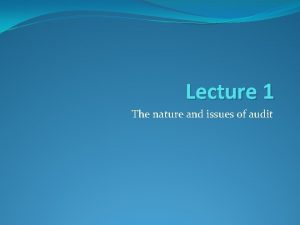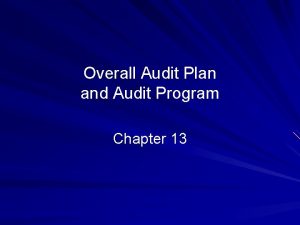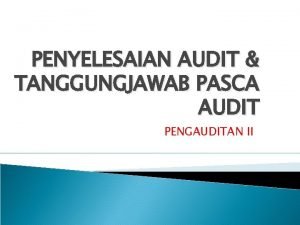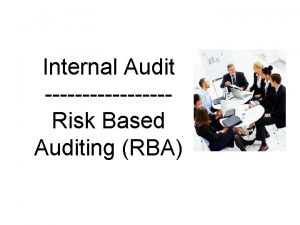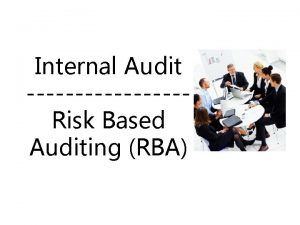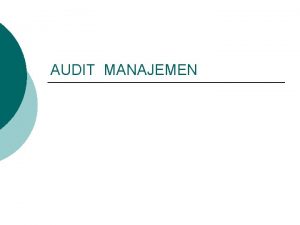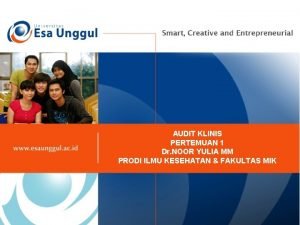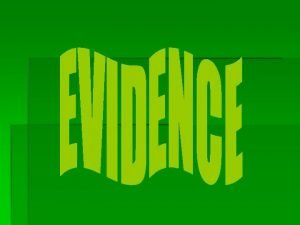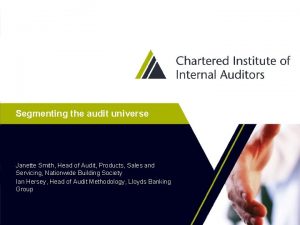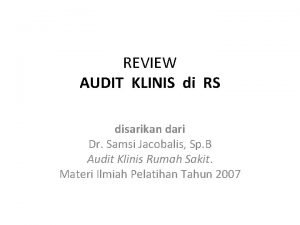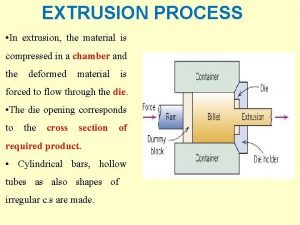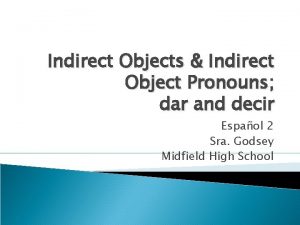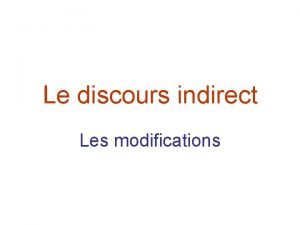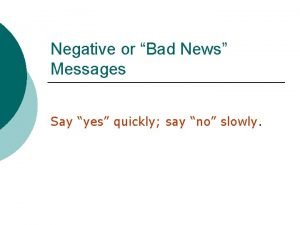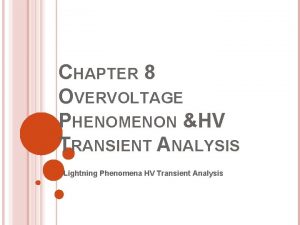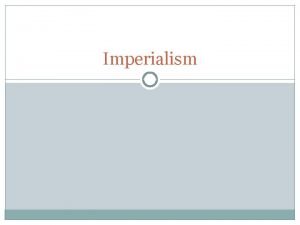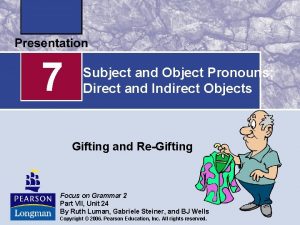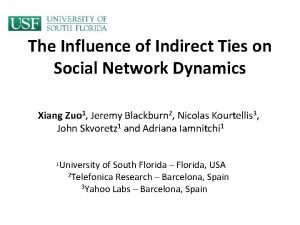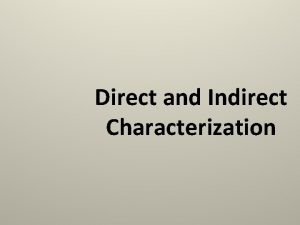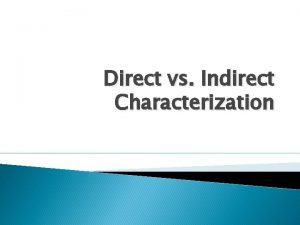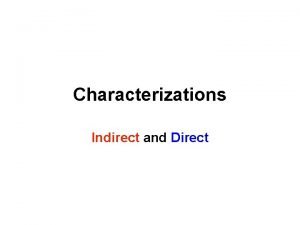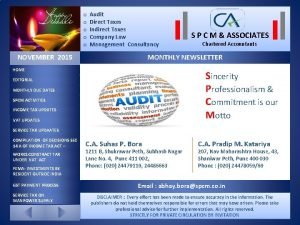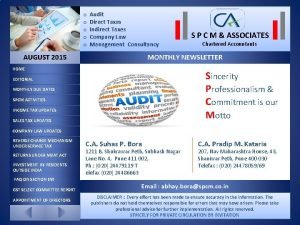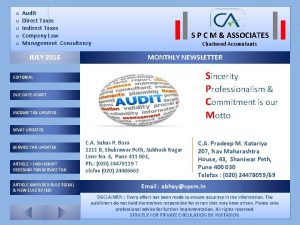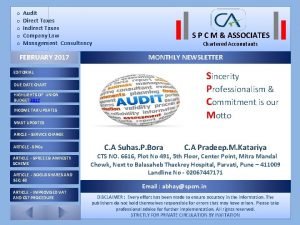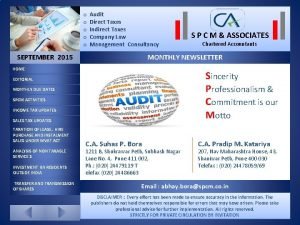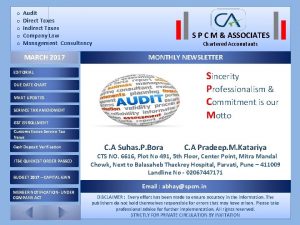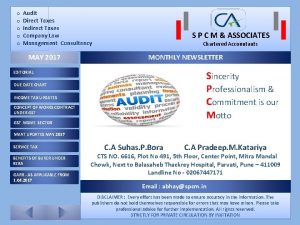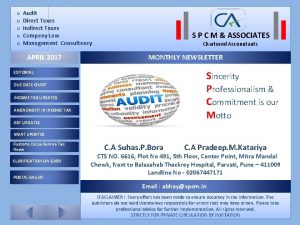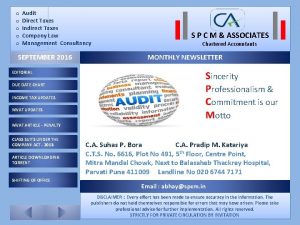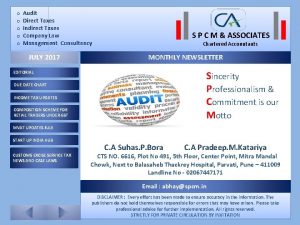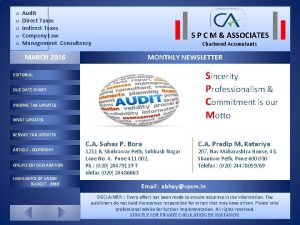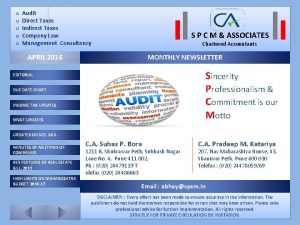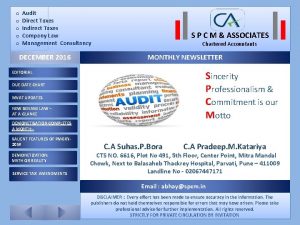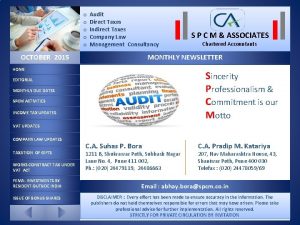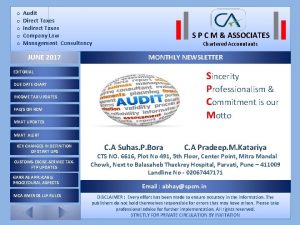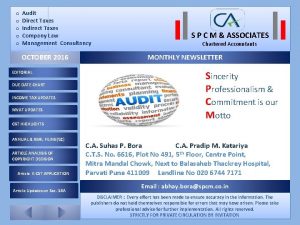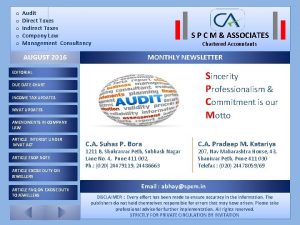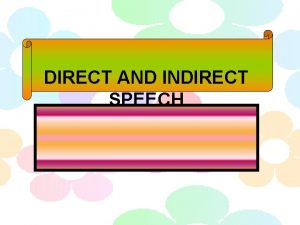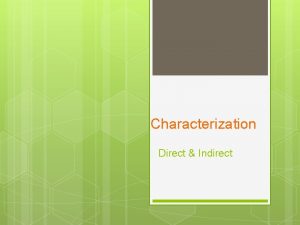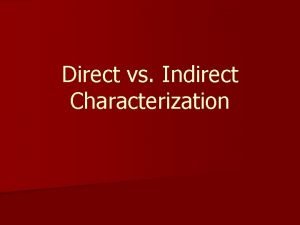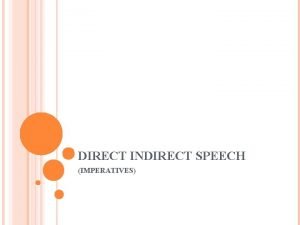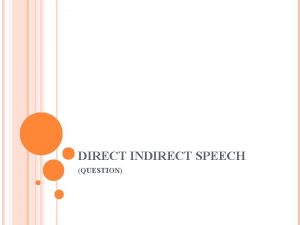o Audit o Direct Taxes o Indirect Taxes
























- Slides: 24

o Audit o Direct Taxes o Indirect Taxes o Company Law o Management Consultancy S P C M & ASSOCIATES Chartered Accountants MONTHLY NEWSLETTER JANUARY 2016 Sincerity Professionalism & Commitment is our Motto EDITORIAL DUE DATE CHART SPCM ACTIVITIES PAN UPDATIONS JAN 2016 INCOME TAX UPDATES MVAT UPDATES SERVICE TAX COMPANY LAW PREPARATION FOR VAT AUDIT C. A. Suhas P. Bora 1211 B, Shukrawar Peth, Subhash Nagar Lane No. 4, Pune 411 002, Phone: (020) 24479119, (020) 24486663 C. A. Pradip M. Katariya 207, Nav Maharashtra House, 43, Shaniwar Peth, Pune 400 030 Phone: (020) 24478059/69 Email : abhay. bora@spcm. co. in DISCLAIMER : Every effort has been made to ensure accuracy in the information. The publishers do not hold themselves responsible for errors that may have arisen. Please take professional advice for further implementation. All rights reserved. STRICTLY FOR PRIVATE CIRCULATION BY INVITATION

JANUARY 2016 SPCM & ASSOCIATES MONTHLY NEWSLETTER Editorial - CA. Suhas P. Bora Dear all, A very happy 2016 to everyone! The year 2015 saw many natural calamities in the shape of earthquakes floods along with acts of terrorism which has forced the western world to wake up to the fault lines created by its own imagery. Back home the impasse on the critical GST bill continues. The moot point is the base level tax as well as the additional 1 percent levy and on this there has not been any agreement so far. We must also remember that it was the UPA that originally brought the GST bill and then opposition led by the NDA opposed it and stalled it. So there is now little room to complain! Finance Minister along with his chief economic advisor Mr. Arvind Subramaniam has stated that a simple rate structures would be there. They also hinted at dropping the 1% additional levy in proposed GST. As things stand the deadline of 1 st of April 2016 for the roll out of the GST is now certainly going to be missed. The government of India has announced a series of steps to ease the business, and kick start the economy. Tax simplification, reining in the black money, more IT usage in the administration of taxation departments are some of them and now we wait for some action on many of the policy initiatives that have been announced. As we move into a new year let us acknowledge the efforts put in by all partners in timely submission of Articles consistently in last 12 month. Friends, we embarked on this journey exactly 12 months before when we started this activity of publishing an E ‐Newsletter. I have personally learnt a lot in this quest which otherwise I would not have considered in my scope and ambit. Let us, on this note, welcome the new year with a hope in our eyes and prayer on our lips. I wish you all a very Happy 2016. CA Suhas P. Bora EDITORIAL DUE DATE CHART SPCM ACTIVITIES PAN UPDATIONS JAN 2016 INCOME TAX UPDATES MVAT UPDATES SERVICE TAX COMPANY LAW PREPARATION FOR VAT AUDIT

SPCM & ASSOCIATES MONTHLY NEWSLETTER JANUARY 2016 DUE DATE CHART MONTHLY DUE DATES REGISTER FOR JANUARY 2016 Due dates 6 th Jan. 2016 ACT SERVICE TAX Particulars E- Payment of Service tax by Companies for December 2015 7 th Jan. 2016 INCOME TAX TDS/TCS Payment for the month of December 2016 15 th Jan. 2016 PROVIDENT FUND Provident Fund Payment for the month of December 2015 15 th Jan. 2016 INCOME TAX Filing of TDS Return for 3 rd Quarter of A. Y. 2016 -17 15 th Jan. 2016 MVAT/CST Last date for Uploading of VAT Audit Report for 2014 -15 21 st Jan. 2016 ESIC 21 st Jan. 2016 MVAT/CST 25 th Jan. 2016 MVAT/CST 31 st Jan. 2016 MVAT/CST Employee State Insurance Corporation Payment for the month of December 2015 E-Payment of Monthly / Quarterly Tax & WCT TDS for December 2015 Last date for Physical Submission of Uploaded VAT Audit Report for 2014 -15 E-filling of Monthly Returns for December 2015 31 st Jan. 2016 PROFESSION TAX E-Payment of Monthly Tax for December 2015 31 st Jan. 2016 LUXURY TAX E-Payment of Monthly Tax for December 2015 NOTE: - If Due date is on Sunday or Public Holidays, the next working day is to be considered as due date. EDITORIAL DUE DATE CHART SPCM ACTIVITIES PAN UPDATIONS JAN 2016 INCOME TAX UPDATES MVAT UPDATES SERVICE TAX COMPANY LAW PREPARATION FOR VAT AUDIT

JANUARY 2016 SPCM & ASSOCIATES MONTHLY NEWSLETTER SPCM ACITIVITES SPCM ACTIVITIES STUDY CIRCLE MEETINGS CONDUCTED IN DECEMBER 2015 DATE TOPICS GROUPS PRESENTERS CHAIR PERSON 12/12/2015 FOREX - AS 11 AND FROM 15 CA AND 15 CB GROUP-I 1. DAMINI MEHTA 2. NIKITA SHAH CA CHETAN R. PARAKH 19/12/2015 Vat Audit Report GROUP-III Niraj Dhadiwal ADV ABHAY BORA FORTHCOMING STUDY CIRCLE MEETINGS IN JANUARY 2016 DATE EDITORIAL TOPICS GROUPS PRESENTERS 09/01/2016 GST OVERVIEW GROUP-I ABHIJEET AMRITKAR 23/01/2016 BANK AUDIT GROUP-II SHUBHAM BORA 16/01/2016 Accounting Standards from 1 st to 15 GROUP-III AISHWARYA KOCHER 02/01/2016 Domestic Transfer Pricing GROUP-II SIDDHI MALPANI DUE DATE CHART SPCM ACTIVITIES PAN UPDATIONS JAN 2016 INCOME TAX UPDATES MVAT UPDATES CHAIR PERSON ADV. ABHAY BORA CA CHETAN PARAKH CA GAURAV OSWAL CA MANOJ JAIN SERVICE TAX COMPANY LAW PREPARATION FOR VAT AUDIT

JANUARY 2016 EDITORIAL DUE DATE CHART SPCM & ASSOCIATES MONTHLY NEWSLETTER SPCM ACTIVITIES PAN UPDATIONS JAN 2016 PAN UPDATION JAN 2016 INCOME TAX UPDATES MVAT UPDATES SERVICE TAX COMPANY LAW PREPARATION FOR VAT AUDIT

JANUARY 2016 SPCM & ASSOCIATES MONTHLY NEWSLETTER Income Tax Updates - Deepali R. Shah INCOME TAX UPDATES A. Notification and Circulars 1. CBDT Clarifies Important Issues On Scope Of Scrutiny In CASS Assessments The CBDT has issued Instruction No. 20/2015 dated 29. 12. 2015 in which it has issued clarifications on several issues in order to facilitate the conduct of scrutiny assessments in cases selected through Computer Aided Scrutiny Selection (‘CASS’). The CBDT has also stated that as far as the returns selected for scrutiny through CASS-2015 are concerned, two type of cases have been selected for scrutiny in the current Financial Year – one is ‘Limited Scrutiny’ and other is Complete Scrutiny’. The assessees concerned have duly been intimated about their cases falling either in ‘Limited Scrutiny’ or ‘Complete Scrutiny’ through notices issued under section 143(2) of the Income-tax Act, 1961 (‘Act’). The procedure for handling ‘Limited Scrutiny’ cases has been explained in detail by the CBDT. 2. CBDT Frowns On Hardship To Taxpayers And Wastage Of Time By Issue Of Vague S. 143(2) Scrutiny Notices By AO The CBDT has issued Instruction No. 19/2015 dated 29. 12. 2015 stating that instances have come to the notice of the Board that in cases selected under scrutiny, while issuing the first notice, Assessing Officers do not convey the specific compliance requirements like production of accounts, furnishing of documents, information, evidences, submission of other requisite particulars etc. Since the taxpayers or their authorized representatives are required to comply with the statutory notice issued by the Assessing Officer, they remain clueless about the information required to be submitted and their appearance before the Assessing Officer does not serve any fruitful purpose except recording of their presence. This causes undue hardship to the taxpayers and unnecessary wastage of their time. The CBDT has directed that Assessing Officers should first go through the returns of income which have been selected for scrutiny and identify the issues which require examination. The initial notice issued under section 143(2) of the Income-tax Act, 1961 should itself be accompanied with the questionnaire containing details of specific documents/information/evidences etc. that are required to be furnished by the taxpayer in connection with scrutiny assessment proceeding in their respective case. 3. CBDT Issues Draft Guiding Principles for determination of Place of Effective Management (POEM) of a Company The CBDT has issued a press release dated 23. 12. 2015 stating that the Finance Act, 2015 has amended, with effect from 01. 04. 2016, the provisions of Income-tax Act relating to determination of residence of a company. In accordance with the amended provisions a company would be said to be resident in India in EDITORIAL DUE DATE CHART SPCM ACTIVITIES PAN UPDATIONS JAN 2016 INCOME TAX UPDATES MVAT UPDATES SERVICE TAX COMPANY LAW PREPARATION FOR VAT AUDIT

JANUARY 2016 SPCM & ASSOCIATES MONTHLY NEWSLETTER Income Tax Updates - Deepali R. Shah any previous year, if it is an Indian company or its Place of Effective Management (POEM) in that year is in India. It is further stated that the Explanatory Memorandum to the Finance Bill, 2015 stated that a set of guiding principles for determination of POEM would be issued for the benefit of the taxpayers as well as the tax administration 4. CBDT Clarifies Law On Applicability Of Minimum Alternate Tax (MAT) On Foreign Companies For Period Prior To 01. 04. 2015 The CBDT has issued Instruction No. 18/2015 dated 23. 12. 2015 clarifying the position with regard to the applicability of Minimum Alternate Tax (MAT) on foreign companies for the period prior to 1. 04. 2015 in the wake of instruction No. 9 dated 02/09/2015, Press Release dated 24. 09. 2015 and the decision of the Supreme Court in the case of Castleton Investment Ltd 5. CBDT Directs Dept to Extend Benefits of Amendments to S. 43 B Retrospectively In Light Of Apex Court Verdict in Alom Extrusions Accordingly, w. c. f. 1. 4. 1988, the settled position is that if the assessee deposits any sum payable by it by way of tax, duty, cess or fee by whatever name called under any law for the time being in force, or any sum payable by the assessee as an employer by way of contribution to any provident fund or superannuation fund or gratuity fund or any other fund for the welfare of employees, on or before the ‘due date’ applicable in his case for furnishing the return of income under section 139(1) or the Act, no disallowance can be made under section 43 B of the Act Circular No. 22/2015 dated 17. 12. 2015 6. CBDT Relaxes Rules Regarding Furnishing Of Information In Respect Of Payments Made To Non-Residents The CBDT has issued a press release dated 17. 12. 2015 stating that section 195 of the Income-tax Act (‘the Act’) empowers the Central Board of Direct Taxes to capture information in respect of payments made to non-residents, whether chargeable to tax or not. Rule 37 BB of the Income-tax Rules has been amended to strike a balance between reducing the burden of compliance and collection of information under section 195 of the Act CBDT press release dated 17. 12. 2015 EDITORIAL DUE DATE CHART SPCM ACTIVITIES PAN UPDATIONS JAN 2016 INCOME TAX UPDATES MVAT UPDATES SERVICE TAX COMPANY LAW PREPARATION FOR VAT AUDIT

JANUARY 2016 SPCM & ASSOCIATES MONTHLY NEWSLETTER Income Tax Updates - Deepali R. Shah B. Recent Reported Decisions - High Court and ITAT 1. Sesa Resources v. ACIT (ITAT Panaji) S. 195/ 40(a)(ia): In view of retrospective amendment to s. 195 to provide that s. 195 applies whether or not the non-resident person has a residence or place of business or business connection in India, commission to nonresident agents for services rendered outside India is liable for TDS u/s 195 and has to suffer disallowance u/s 40(a)(ia) In respect of the issue as to whether the Assessee was liable to deduct TDS u/s 195 and whether the disallowance was liable to be made u/s 40(a)(ia) of the Act, it is noticed that the provisions of s. 195 has been amended by the introduction of the Explanation-II to the said section by the Finance Act, 2012, with retrospective effect from 1. 4. 1962, whereby it is clarified that ‘the obligation to comply with sub-section (1) and to make deduction thereunder applies and shall be deemed to have applied and extends and shall be deemed to have always extended to all persons, resident or nonresident, whether or not the non-resident person has (i) a residence or place of business or business connection in India…’ In view of the introduction of Explanation II to s. 195… the disallowance… would have to be restored 2. ITO v. Bombaywala Readymade Stores 230 Taxman 313 (Guj HC) Section 271(1)(c): Penalty -Concealment –Addition on estimate basis-Levy of penalty not justified. During search excess stock was found on physical verification as against book stock worked out as on date of search. Assessee did not file return of income for relevant year in which search has been conducted. Assessing Officer completed assessment for relevant assessment year on basis of material available with him. Penalty proceedings were initiated for concealing particulars of income. Dismissing the appeal of revenue the court held that since no income has been filed by the assessee and income was assessed on estimated basis by the revenue no penalty under section 271(1)(c) could be levied on concealment of income. 3. Ravi Sud v. ACIT 39 ITR 356 (Mum Trib) Section 271(1)(c): Penalty -Concealment – Revised Return beyond time – Assessment was done just to validate in valid revise return –Levy of penalty was not justified Tribunal held that no escapement of income was detected during the original assessment proceedings and no proceedings were initiated against the assessee, though it was found that chartered accountant was operating bogus firms, pursuant to search action. The assessee had suo moto offered the additional income. EDITORIAL DUE DATE CHART SPCM ACTIVITIES PAN UPDATIONS JAN 2016 INCOME TAX UPDATES MVAT UPDATES SERVICE TAX COMPANY LAW PREPARATION FOR VAT AUDIT

JANUARY 2016 SPCM & ASSOCIATES MONTHLY NEWSLETTER Income Tax Updates - Deepali R. Shah The assessment proceedings under section 147 of the Act were carried out just to validate the invalid revised returns and not on account of detection of escapement of income . Therefore it was not a fit case for levy of penalty under section 271(1)(c) of the Act. 4. Bridal Jewellery Mfg. Co vs. ITO (ITAT Delhi) S. 10 A: Even undisclosed income surrendered by assessee is eligible for s. 10 A exemption if dept does not show that the assessee has any other source The decision of the Hon’ble Madras High Court in the case of CIT Vs S. Khader Khan Son (2008) 300 ITR 157 is of no help to the assessee because the assessee agreed during the course of survey for the addition only when discrepancies in the loose papers were found. The assessee surrendered Rs. 11 lakhs to cover up the irregularities of the business and short coming found during the course of survey. The said surrender was related to the regular business of the assessee and it is not brought on record that the assessee earned the said income from any other source. Therefore, the deduction u/s 10 A of the Act was allowable to the assessee being 100% Export Oriented Unit established in SEZ on this income also. In view of the above we uphold the addition made by the AO and sustained by the CIT(A), however, the AO is directed to allow the deduction u/s 10 A of the Act. 5. Pr CIT vs. Bharti Overseas Pvt. Ltd (Delhi High Court) S. 14 A & Rule 8 D(2)(ii): Interest incurred on taxable income has also to be excluded while computing the disallowance to avoid incongruity & in view of Department’s stand before High Court Rule 8 D (2) states that the expenditure in relation to income which is exempt shall be the aggregate of (i) the expenditure attributable to tax exempt income, (ii) and where there is common expenditure which cannot be attributed to either tax exempt income or taxable income then a sum arrived at by applying the formula set out thereunder. What the formula does is basically to “allocate” some part of the common expenditure for disallowance by the proportion that average value of the investment from which the tax exempt income is earned bears to the average of the total assets. It acknowledges that funds are fungible and therefore it would otherwise be difficult to allocate the sum constituting borrowed funds used for making tax-free investments. Given that Rule 8 D (2) (ii) is concerned with only ‘common interest expenditure’ i. e. expenditure which cannot be attributable to earning either tax exempt income or taxable income, it is indeed incongruous that variable A in the formula will not also exclude interest relatable to taxable income. This is precisely what the ITAT has pointed out in Champion Commercial (supra). There the ITAT said that by not excluding expenditure directly relatable to taxable income, Rule 8 D (2) (ii) ends up allocating “expenditure EDITORIAL DUE DATE CHART SPCM ACTIVITIES PAN UPDATIONS JAN 2016 INCOME TAX UPDATES MVAT UPDATES SERVICE TAX COMPANY LAW PREPARATION FOR VAT AUDIT

JANUARY 2016 SPCM & ASSOCIATES MONTHLY NEWSLETTER Income Tax Updates - Deepali R. Shah by way of interest, which is not directly attributable to any particular income or receipt, plus interest which is directly attributable to taxable income. ” This is contrary to the intention behind Rule 8 D (2) (ii) read with Section 14 A of (1) and (2) of the Act C. Unreported Decisions 1. ITO v. Clear Channel Mumbai Pvt. Ltd. , ITA Nos. 7711/Mum/2012 dt. 13/05/2015, AY 2006 -07 (ITAT Mumbai) Sec. 43(5) – Set off of carried forward speculation loss against share trading income. The assessee set off its carried forward speculation loss of AY 2002 -03 against share trading income for the year under consideration. The AO was of the opinion that the section 43(5) stipulated that derivative transactions would not be deemed to be a speculative transaction w. e. f. AY 2006 -07, and hence, carried forward speculation loss could not be set off against income from such derivative transactions. Relying on the decision of Bombay High Court in the case of CIT v. Lokmat Newspapers (P) Ltd. [2010] 322 ITR 43 (Bom. ), it was held that the expression "any speculation business" in section 73 meant a speculation business in respect of which profits and gains for the assessment year in question have arisen, and that there was no justification to restrict the content of that speculation business where profits have arisen by excluding a business involving actual delivery of shares. No such restriction was found in the Explanation. Hence, once the assessee was carrying on a speculation business and the profits and gains had arisen from that business during the course of the assessment year, the assessee was entitled to set off the losses carried forward from a speculation business arising out of a previous assessment year. EDITORIAL DUE DATE CHART SPCM ACTIVITIES PAN UPDATIONS JAN 2016 INCOME TAX UPDATES MVAT UPDATES SERVICE TAX COMPANY LAW PREPARATION FOR VAT AUDIT

JANUARY 2016 SPCM & ASSOCIATES MONTHLY NEWSLETTER MVAT Updates - CA GOURAV OSWAL, CA NIKITA BAJAJ VAT UPDATES RECENT AMENDMENTS Trade Circular No 19 T of 2015 Dt. 21. 12. 2015 The Commissioner of Sales Tax, Maharashtra State, Mumbai has issued Trade Circular no 19 T of 2015 Dt. 21. 12. 2015 for downloading of digitally signed Registration Certificates from the dealers login. At present dealers seeking new registration under the MVAT Act 2002 are required to submit an online application with the prescribed documents. If all the information and documents are found to be correct, the registration officer grants TIN to the dealer and the printed copy of the registration certificate is sent to the dealer through speed post at the address mentioned in the application. To avoid the delay in delivery of registration certificates and ensure immediate availability of the registration certificate to the applicant, a facility has been made available to download the digitally signed registration certificate from the website of Maharashtra Sales Tax Department i. e www. mahavat. gov. in. However this facility is made available to dealers to whom registration certificates have been granted on or before 22 nd December 2015. It may be noted that the physical copies of registration certificates will still be continued to be sent by speed post at the address mentioned in the application. The detailed procedure for downloading the registration certificates is mentioned in the Annexure A attached to the circular. B. GIST OF IMPORTANT DDQ’S M/s Rubicon Formulations Pvt Ltd No. DDQ-11 -2013/Adm-6/8/B-1 dt. 21. 10. 2015 The product “Clipper Lighter Gas” : Is not covered by the schedule entry C‐ 58(b) of the MVAT Act 2002 Is not an LPG for domestic use In the absence of specific schedule entry, it falls in the residuary schedule entry E‐ 1 and hence liable to tax @ 12. 5% M/s Philips Electronics India Ltd No. DDQ 11 -2012/Adm-6/16/B-2 dt. 27. 10. 2015 -T-5 The product “T‐ 5 Energy Saver Lamp” : Is not covered by the schedule entry C‐ 111 of the MVAT Act 2002 Is a Linear Fluorescent Tube and not a Compact Fluorescent Lamp In the absence of specific schedule entry, it falls in the residuary schedule entry E‐ 1 and hence liable to tax @ 12. 5% M/s SRF LTD No. DDQ-11 -2013/Adm-6/43/B-1 dt. 06. 11. 2015 Central Excise Tariff Heading 3824 does not cover the Refrigerant Blends namely “Floron HFC 404 A” and “Floron HFC 407 C” for the purpose of schedule entry C‐ 54 of the MVAT Act 2002 and the impugned product falls under residuary schedule entry E‐ 1 and therefore liable to tax @ 12. 5% EDITORIAL DUE DATE CHART SPCM ACTIVITIES PAN UPDATIONS JAN 2016 INCOME TAX UPDATES MVAT UPDATES SERVICE TAX COMPANY LAW PREPARATION FOR VAT AUDIT

JANUARY 2016 SPCM & ASSOCIATES MONTHLY NEWSLETTER MVAT Updates - CA GOURAV OSWAL, CA NIKITA BAJAJ M/s Mihir Enterprises No. DDQ 11/2012/Adm-6/43/B-2 dt. 09. 11. 2015 The product “Chataka Pataka” is not a goldfinger as notified under the entry for Farsan. The products “Chataka Pataka”, “Masala Peas‐Vatana”, and “Masala Sing” falls under residuary schedule entry E‐ 1 and therefore liable to tax @ 12. 5%. The request for prospective effect is rejected. M/s Venus Petrochemicals (Bombay) Pvt Ltd No. DDQ-11/2015/Adm-6/2/B-3 dt. 17. 11. 2015 Freight charged seperately in the invoice is a part of sale price and would be amenable to the levy of tax under MVAT Act 2002 even though the sales are ex‐refinery and all the incidental expenses like octroi, insurance and freight etc. are borne by the buyer. M/s Agro Engineering Industries No. DDQ-11/2013/Adm-6/22/B-1 dt. 05. 12. 2015 The products “Grader (Seperator)” and “Gravity Seperator” : Are not agricultural machineries covered by the schedule entry C‐ 1 of the MVAT Act 2002 In the absence of specific schedule entry, it falls in the residuary schedule entry E‐ 1 and hence liable to tax @ 12. 5% The request for grant of prospective effect to the determination order is rejected. M/s Etihad Airways No. DDQ-11 -2013/Adm-6/46/B-2 dt. 16. 12. 2015 The application for determination of tax was rejected since the applicant being purchaser of ATF and not of cotton or oilseeds, and hence the seller is liable to pay tax into the treasury of Government and not the purchaser. EDITORIAL DUE DATE CHART SPCM ACTIVITIES PAN UPDATIONS JAN 2016 INCOME TAX UPDATES MVAT UPDATES SERVICE TAX COMPANY LAW PREPARATION FOR VAT AUDIT

JANUARY 2016 SPCM & ASSOCIATES MONTHLY NEWSLETTER SERVICE TAX CORNER- CA. CHETAN PARAKH SERVICE TAX CORNER PROSECUTION PROVISIONS IN SERVICE TAX Introduction - Prosecution is the commencement of a criminal proceeding, where the Government exhibits before a Court of Law the formal charges against a person accused of an offense and seeks to impose on such person a suitable punishment and penalty. Thus, in Central Excise, prosecution sets a legal process by which Government seeks to ensure punishment of companies and persons concerned with evasion of Central Excise duty/ Service Tax. Legal Provisions Punishable Offences under the Central Excise Act, 1944 Section 9 of the Central Excise Act, 1944 defines commission of the following offences as punishable: ‐ contravening any of the provisions of Section 8 or of a rule made under specific clauses sub‐section (2) of Section 37; evading payment of duty under the Act; removing excisable goods or concerning himself with such removal in contravention to the Act and Rules; acquiring or in any way concerning himself with transporting, depositing, concealing, selling, purchasing or otherwise dealing with excisable goods where he knows or has reason to believe that the goods are liable to confiscation under the Act and Rules; contravening any provision in relation to Cenvat Credit under the Act and Rules; failure to supply information or knowingly supplying false information; attempting to commit or abetting commission of an offence relating to evasion of duty or transit of goods or restriction on storage of goods or non‐registration of a unit. Punishable Offences under the Finance Act, 1994 Section 89 of the Finance Act, 1994 defines the following offences as punishable in relation to Service Tax: knowingly evades payment of service tax under this chapter or avails and utilizes credit of taxes and duty without actual receipt of taxable service or excisable goods either fully or partially in violation of rules made under the provisions of this chapter or maintains false books of accounts or failure to supply any information which he is required to supply or collects any amount as service tax but fails to pay the amount to the credit of Central Govt, for a period of more than six months. EDITORIAL DUE DATE CHART SPCM ACTIVITIES PAN UPDATIONS JAN 2016 INCOME TAX UPDATES MVAT UPDATES SERVICE TAX COMPANY LAW PREPARATION FOR VAT AUDIT

JANUARY 2016 SPCM & ASSOCIATES MONTHLY NEWSLETTER SERVICE TAX CORNER- CA. CHETAN PARAKH If either of the above offences have taken place, then the assessee shall be punishable : i) In the case of an offence specified in clause (a), (b) or (c) where the amount exceeds Rs. 50 Lakhs, with imprisonment for a term which may extend to 3 years. ii) In the case of the offence specified in clause (d), where the amount exceeds Rs. 50 Lakhs, with imprisonment for a term which may extend to 7 years. iii) In the case of any other offences, with imprisonment for a term, which may extend to one year. Person liable to be prosecuted – Whoever commits any of the offences specified under sub-section (1) of Section 9 of the Central Excise Act, 1944 or sub-section (1) of section 89 of the Finance Act, 1994, can be prosecuted. Section 9 AA (1) of Central Excise Act, 1944 provides that where an offence under this Act has been committed by a company, every person who, at the time offence was committed was in charge of, and was responsible to, the company for the conduct of the business of the company, as well as the company, shall be deemed to be guilty of the offence and shall be liable to be proceeded against and punished accordingly. Section 9 AA (2) of Central Excise Act, 1944 provides that where an offence under this Act has been committed by a company and it is proved that the offence has been committed with the consent or connivance of, or is attributable to any neglect on the part of, any director, manager, secretary or other officer of the company, such director, manager, secretary or other officer shall be deemed to be guilty of that offence and shall be liable to be proceeded against and punished accordingly. Explanation to Section 9 AA provides that (a) “Company” means anybody corporate and includes a firm or other association of individuals and (b) “director” in relation to a firm means a partner of the firm. These provisions under Section 9 AA of Central Excise Act, 1944 have been made applicable to Service Tax also vide Section 83 of the Finance Act, 1994. EDITORIAL DUE DATE CHART SPCM ACTIVITIES PAN UPDATIONS JAN 2016 INCOME TAX UPDATES MVAT UPDATES SERVICE TAX COMPANY LAW PREPARATION FOR VAT AUDIT

JANUARY 2016 SPCM & ASSOCIATES MONTHLY NEWSLETTER SERVICE TAX CORNER- CA. CHETAN PARAKH Cognizance of an offence – Section 9 A(2) of Central Excise Act, 1944 provides the Chief Commissioner of Central Excise to compound any offence under the Act. An amendment to Section 83 of the Finance Act, 1994 with effect from 8 April 2011 provides for the compounding of offences relating to Service Tax. ‘Compound’ means to settle amicably. Compounding is essentially a compromise between the prosecuting authority and the prosecuted entity. The prosecuted person/entity agrees to pay the composition amount through this procedure in lieu of dropping prosecution. Compounding can be either before or after the institution of prosecution procedures. If the case is pending, then the Court is informed about the compromise arrived and requested not to proceed with the case. When the offences cannot be compounded – In the following cases, compounding is not permissible: – a) If a person has been allowed to compound offence once in respect of offences under Section 9(1)(a), (bb), (bbbb) or (c) of Central Excise Act, 1944. b) In case of Excise offences under Narcotics Drugs and Psychotropic Substances Act, 1985. c) If a person was allowed to compound case once in respect of any offence for goods of value exceeding rupee one crore. d) If a person was convicted by the Court under Central Excise Act, 1944 on or after 30 December 2005. Central Excise (Compounding of Offences) Rules, 2005 and Service Tax (Compounding of Offences) Rules, 2012 prescribe the respective compounding procedures. Conclusion – From the above provisions, it can be seen that Provisions for violation of Service tax under certain circumstances are very harsh and stringent. Thus it is advised to all the service tax payers to comply with the service tax provisions, make the payment on time and file the half yearly return within due date to avoid the consequences and prosecution provisions. EDITORIAL DUE DATE CHART SPCM ACTIVITIES PAN UPDATIONS JAN 2016 INCOME TAX UPDATES MVAT UPDATES SERVICE TAX COMPANY LAW PREPARATION FOR VAT AUDIT

JANUARY 2016 SPCM & ASSOCIATES MONTHLY NEWSLETTER SERVICE TAX CORNER- CA. CHETAN PARAKH RECENT JUDGEMENTS IN SERVICE TAX : 1) In the recent two judgments of CESTAT whole understanding of law and Sec. 68(2) has been reversed and allow the Service tax payable in case where GTA service is payable by recipient out of CENVAT Credit. CCE Indore Vs. Deepak Spinners Ltd. [ CESAT New Delhi] CCE Indore Vs. Uflex Ltd [ CESAT New Delhi] CCE, Chandigarh vs. Deepak Spinners Ltd. – 2013 (32) STR 531 (H. P. ), High Court of Himachal Pradesh Commissioner vs. Nahar Industrial Enterprises Ltd. 2012 (25) STR 129 (P&H), Punjab & Haryana High Court In all the above referred cases, it is held that CENVAT credit can be utilised for payment of service tax on GTA service under Reverse Charge Mechanism. Now after the above said judgement, big question arises about whether the other services stipulated in Notification No. 30/2012 can be paid out of CENVAT or not. The same will be clarified by the CBEC shortly. 2) In the case of Hindalco Industries Ltd. v. CCE&ST Stay Order No. SO/52074/2015‐EX(DB), in Application No. E/Stay/54680/2014 in Appeal No. E/54127/2014‐EX(DB), dated 18 May 2015, it has been held that Credit taken on supplementary invoices was allowed since there was no evidence that adjudication order passed against input service provider confirming demands for evasion of service tax. In this case, when the department alleges that this service tax had been paid by the service providers under supplementary invoices and those supplementary invoices had been issued for the service tax which had earlier been evaded by them and was paid on the service tax evasion being detected, the burden would be on the department to produce evidence in this regard. Neither the show cause notice while making this allegation, gives details of the show cause notices issued to the service providers and of the adjudication order confirming service tax demands under proviso to Section 73(1) against them nor such documents had been provided to the appellant. Even the order‐in‐original besides repeating the allegations contained in para 4 of the show cause notice does not give any details. Hence, Cenvat credit cannot be denied to the assessees. EDITORIAL DUE DATE CHART SPCM ACTIVITIES PAN UPDATIONS JAN 2016 INCOME TAX UPDATES MVAT UPDATES SERVICE TAX COMPANY LAW PREPARATION FOR VAT AUDIT

JANUARY 2016 SPCM & ASSOCIATES MONTHLY NEWSLETTER COMPANY LAW – CA MANOJ JAIN & CS ADITI JOSHI ISSUE OF SHARE CERTIFICATE UNDER COMPANIES ACT 2013 On the occasion of start of the New Year 2016, in this Article we will understand the new Compliances under New Law i. e. Companies Act 2013 regarding issue of Share Certificates. Shares are the property of the person who owned the same. Unlike other properties we cannot show the shares to prove the entitlement, we need a certificate. In this article let’s understand the procedure for issue of share Certificate and some provisions regarding the same in the Companies Act 2013 MEANING OF SHARE CERTIFICATE: A share Certificate is a document issued by company evidencing that the person named in the certificate is owner of number shares of Company as specified in the Certificate. TIME PERIOD FOR ISSUE OF SHARE CERTIFICATES: In case of Incorporation: With in a period of 2 (Two) Month from the date of Incorporation to the subscriber of Memorandum. In case of Allotment: With in a period of 2 (Two) Month from the date of allotment of shares. In case of Transfer: With in a period of 1 (One) Month from the date of receipt of instrument of Transfer by the Company. REQUIREMENT FOR ISSUE OF SHARE CERTIFICATE: A Company shall provide one certificate to a member for all his shares without payment of any charges. If a Shareholder want more than one Certificate: If a shareholder want more than one certificate for one or more of shares than company may issue several certificates, upon payment of Rs. 20/‐ each certificate after the first. If Shares hold Jointly by several person: The Company shall not be bound to issue more than one certificate, and delivery of a certificate for a share to one of several join holders shall be sufficient delivery to all such holders. EDITORIAL DUE DATE CHART SPCM ACTIVITIES PAN UPDATIONS JAN 2016 INCOME TAX UPDATES MVAT UPDATES SERVICE TAX COMPANY LAW PREPARATION FOR VAT AUDIT

JANUARY 2016 SPCM & ASSOCIATES MONTHLY NEWSLETTER COMPANY LAW – CA MANOJ JAIN & CS ADITI JOSHI SHARE CERTIFICATE SHALL SPECIFY FOLLOWINGS MATTER: Share Certificate shall issue in form SH‐I or near as possible. Certificate should specifying Name of Member. Every Certificate shall be under the Common Seal of the Company. It shall specify the Number of Shares it relates. It shall specify the amount paid on those Shares. It shall specify the Distinctive No. of Shares. It shall specify the Number of Share Certificate. It shall specify the Folio No. of Member. Name of Company, CIN of Company and Registered Office Address of the Company. REQUIREMENT FOR ISSUE OF SHARE CERTIFICATE: There should be an allotment or Subscription at the time of Incorporation. A Board resolution should be passed in the Board Meeting for issue of Certificate. (Share Certificate can be issued only under authority of Board of Directors by a Board Resolution. ) Share Certificate shall specify the matter mention in above. Share Certificate should be issue under the signature of Two Director and (One of the Directors should be person other than Managing or Whole Time Director, if such person is available on the Board of Directors. Company Secretary, if any or any other person authorized by Board of Directors. (Company Secretary of the Company shall be deemed to be authorized to sign the Share Certificates) Share Certificate Must be ‘Issued’ from registered office only. After issue of Share Certificate, Company should pay stamp duty on issue of share certificate as per Stamp Act of the State. EDITORIAL DUE DATE CHART SPCM ACTIVITIES PAN UPDATIONS JAN 2016 INCOME TAX UPDATES MVAT UPDATES SERVICE TAX COMPANY LAW PREPARATION FOR VAT AUDIT

JANUARY 2016 SPCM & ASSOCIATES MONTHLY NEWSLETTER COMPANY LAW – CA MANOJ JAIN & CS ADITI JOSHI ISSUE OF RENEWED SHARE CERTIFICATE: Company can issue fresh certificate by splitting, consolidating or replacing old certificate. FRESH Certificate can be issued: Fresh Certificate can be issued in following cases: i. If the Share Certificate are sub‐divided consolidated or ii. In replacement of those which are defaced, mutilated, torn or old, decrepit, worn out or iii. Where the pages on the reverse for recording transfer have been duly utilized. CONDITION for issue of Fresh Certificate: Fresh Certificate will be issue after surrender of old Certificate. Company can charge upto Rs. 50/‐ pre certificate as decided by the Board. CHARGES for issue of Fresh Certificate (in lieu of Consolidation, sub‐division): Company can charge for Sub‐divided or consolidated or old share Certificate. But Company Can’t charge where pages on reverse for recording transfer have been utilized. If fresh certificates issued pursuant to scheme of arrangement sanctioned by the High Court or Central Government No fee shall be payable. “Where a fresh certificate is issued as above, It shall be stated on the face of it and be recorded in the Register maintained for the purpose, that it is. #Issued in lieu of share certificate No…… sub‐divided/replaced/on consolidation#. {Rule 6(1)(b) of Companies, (Share Capital and Debentures) Rules, 2014. CHARGES for issue of Fresh Certificate (in lieu of Old and worn out Certificates): A member can apply to company for replacement of old, torn, defaced or worn out certificates. If the company is LISTED, it can’t charge any amount. If the Company is not listed, it can charge upto Rs. 20/‐ per share for issuing new share certificates. Original Share Certificate must be surrendered to the Company. EDITORIAL DUE DATE CHART SPCM ACTIVITIES PAN UPDATIONS JAN 2016 INCOME TAX UPDATES MVAT UPDATES SERVICE TAX COMPANY LAW PREPARATION FOR VAT AUDIT

JANUARY 2016 SPCM & ASSOCIATES MONTHLY NEWSLETTER COMPANY LAW – CA MANOJ JAIN & CS ADITI JOSHI RECORD TO BE MAINTAINED Record of renewed and Duplicate Share Certificates shall be maintained in Form SH‐ 2. The register shall be kept at registered office or where register of member is kept in proper custody. All entries made in register shall be authenticated by Company Secretary or authorized person. DUPLICATE SHARE CERTIFICATE: Situations When duplicate Share Certificates can be issued, if original certificate is lost or destroyed. PROCESS FOR ISSUE OF DUPLICATE SHARE CERTIFICATES: Shareholder will inform the Company about lost of Share Certificate. Company can ask for followings : Payment of fees of Rs. 50/‐ per share Supporting Evidence Indemnity Bond Payment of out of pocket expenses incurred by the company in investigation the evidence produced. Share Certificate shall state prominently on the face of it and be recorded in the Register maintained for the purpose that it is “DUPLICATE ISSUED IN LIEU OF SHARE CERTIFICATE NO……: ” iv. The word “DUPLICATE” shall be stamped or printed prominently on the face of the Share Certificate. TIME PERIOD FOR ISSUE OF DUPLICATE SHARE CERTIFICATES: In case of Unlisted Companies: The duplicate share certificates shall be issued within a period of 3 (Three) month. In case of Listed Companies: The duplicate share Certificate shall be issued 15 (fifteen) days, from the date of submission of complete documents with the Company. RECORD TO BE MAINTAINED Record of renewed and duplicate shares certificates shall be maintained in form SH‐ 2. The register shall be kept at registered office or where register of member is kept in proper custody. All entries made in register shall be authenticated by Company Secretary or authorized person. “Have A Happy Compliant Year 2016. ” EDITORIAL DUE DATE CHART SPCM ACTIVITIES PAN UPDATIONS JAN 2016 INCOME TAX UPDATES MVAT UPDATES SERVICE TAX COMPANY LAW PREPARATION FOR VAT AUDIT

SPCM & ASSOCIATES MONTHLY NEWSLETTER JANUARY 2016 PREPARATION FOR VAT AUDIT - Adv. Abhay H Bora. PREPARATION FOR VAT AUDIT CHECK LIST AND REQUIREMENTS FOR VAT AUDIT I. BASIC DETAILS REQUIRED 1. Constitution of the Business (Proprietorship/partnership/Company /HUF/Society/Trust) 2. Trade name (if any in which the business is carried on. ) 3. Address of Place of Business (Principal place and Additional places & the divisions or units for which separate books of accounts are maintained, if any) 4. Address of place of business where books of accounts are normally kept 5. Name & version of accounting software in use. 6. E‐mail address. 7. Nature of Business – (Manufacturer, reseller, Work Contractor, Lessor, Bakery, Restaurant, Labour charges, Job Work, Importer etc. ) 8. Business activity of dealer & Activity code no. 9. Whether any new business activities are started during the period under Audit. 10. Whether any new products introduced during the period under Audit. 11. Class of products dealt in‐ List of goods dealt in along with their classification schedule entry/notification entry and rate of tax. 12. Method of accounting 13. List of Books of accounts and Sales tax related records maintained. 14. Details of all bank accounts‐ Name, branch BSR no, type of a/c and a/c No. 15. Method of Stock Valuation adopted during the year. 16. Policies & manuals available with regard to accounting system, software, Purchases, Sales, Stock transfers etc. 17. Whether entitled for PSI benefit viz. Exemption Scheme/Deferral Scheme EDITORIAL DUE DATE CHART SPCM ACTIVITIES PAN UPDATIONS JAN 2016 INCOME TAX UPDATES MVAT UPDATES SERVICE TAX COMPANY LAW PREPARATION FOR VAT AUDIT

SPCM & ASSOCIATES MONTHLY NEWSLETTER JANUARY 2016 PREPARATION FOR VAT AUDIT - Adv. Abhay H Bora. 18. Whether opted for composition scheme in case of retailer / bakery / restaurant / caterer / second hand Motor Vehicle dealers 19. Whether profession tax returns filed & payment as per returns made. 20. Name of Tax Auditor. 21. Date of Tax Audit Report. 22. Details and Computation of Composition sum paid/payable under different schemes/Notifications. II DOCUMENTS AND RECORDS 1. Books of accounts and other sales tax related records and registers maintained. 2. Set of books of Account as per list: i. e Sales Register, Purchase Register, Journal Register, Cash Book, Bank Book, General Ledger, stock register and other books maintained for the purpose of sales tax records such as Inter Branch Transfers, Declarations Consumption register (C, D, F, . E‐I, E‐II, ) Set off Register, Register for addition to fixed assets, Declarations received register, Registers for VAT TDS deducted and certificates issued etc. 3. Copy of all bank statements & bank books. 4. Certified true copy of Trading Account, Profit and Loss Account and Balance Sheet along with the schedules for the previous year and for the year under audit. 5. Certified true copy of the Statutory Audit Reports, if any required, under various laws for the previous year and current year. 6. Certified true copy of the Tax Audit Reports, if any required, Income Tax Act, 1961 for the previous year and current year. 7. Certified true copies of returns filed under MVAT Law and CST Act including fresh returns and revised returns along with copies of tax payment challans. 8. Consolidation of Sales and Purchases and deductions claimed as per the returns filed and taxes paid giving due dates and dates of taxes paid. 9. Duplicate Copies of Sales Invoices 10. Original Purchase Invoices 11. Original Invoices for purchase of Assets and purchase invoices for purchases in the nature of expenses 12. Counterfoils of declarations under CST consumed. ( From C, D, E‐II, F, H ) 13. Original Declarations received for Concessional Sales (C forms, F forms or any other declarations claiming exemption or reduction in tax) EDITORIAL DUE DATE CHART SPCM ACTIVITIES PAN UPDATIONS JAN 2016 INCOME TAX UPDATES MVAT UPDATES SERVICE TAX COMPANY LAW PREPARATION FOR VAT AUDIT

JANUARY 2016 SPCM & ASSOCIATES MONTHLY NEWSLETTER PREPARATION FOR VAT AUDIT - Adv. Abhay H Bora. 14. Copies of tax paid Challans along with certified copies of periodic returns filed. 15. Certified true copies of Constitutional Document (partnership deed/trust deed/memorandum and articles of association), Registration certificate under MVAT Act, CST Act, Tax Deduction A/c No. , Eligibility Certificate, Entitlement Certificate, Profession Tax R. C. , Profession Tax E. C. , Income Tax PAN, Central Excise Regn. No. , ECC No. , I. E. C. Certificate and any other registration certificate required under laws administered by Sales Tax, Income Tax, Central Excise and Customs Departments. 16. Transport receipts and other related documents evidencing sales effected outside Maharashtra State 17. The records relating to receipts , dispatch & delivery of goods. 18. Purchase Orders, Bill of lading, customs duty receipt etc regarding export and import transactions. III) STATEMENTS 1. Statement of General Information i. e. Name, address, registration number, additional place of business, nature of business, class of products, constitution of business, profession tax enrollment and registration numbers, PAN No. , ECC No. , IEC Code and particulars of all bank accounts. 2. Statement of Computation of Annual Tax Liability. 3. Statement of details of amount paid with return 4. Summary Statement of Sales on the basis of which returns are filed along with consolidation statement. 5. Summary Statement of Purchases on the basis of which returns are filed along with consolidation statement. 6. Revised monthly summary statement of Sales and Purchases after finalisation of accounts along with reconciliation statement in case of difference. 7. Statement of Details of Addition to fixed assets. 8. Statement of Details of disposal of fixed assets showing particulars such as. 9. Statement of Purchases against issue of Declarations under CST Act 10. Dealerwise Statement of within state purchases of taxable goods from registered dealer for which set off is claimed. 11. Statement of TDS Certificate received: 12. Yearly Statement of Credit Notes on A/c of Goods Return (to be bifurcated as: 1. within 6 months; 2. More than 6 Months), Rate Difference, Discount, etc. 13. Statement of details of OMS sales for which C/E/F/H/I Declarations not received. EDITORIAL DUE DATE CHART SPCM ACTIVITIES PAN UPDATIONS JAN 2016 INCOME TAX UPDATES MVAT UPDATES SERVICE TAX COMPANY LAW PREPARATION FOR VAT AUDIT

S P C M & ASSOCIATES Chartered Accountants Thank You &Wish you happy new year 2016
 Vouching
Vouching Overall audit plan and audit program
Overall audit plan and audit program Penyelesaian audit dan tanggung jawab pasca audit
Penyelesaian audit dan tanggung jawab pasca audit Perbedaan audit konvensional dengan audit berbasis risiko
Perbedaan audit konvensional dengan audit berbasis risiko Perbedaan audit konvensional dengan audit berbasis risiko
Perbedaan audit konvensional dengan audit berbasis risiko Perbedaan audit manajemen dan audit keuangan
Perbedaan audit manajemen dan audit keuangan Auditing means
Auditing means Audit klinis adalah
Audit klinis adalah Prosedur audit bottom-up dan audit top-down
Prosedur audit bottom-up dan audit top-down Audit universe definition
Audit universe definition Beda audit medis dan audit klinis
Beda audit medis dan audit klinis Side extrusion process
Side extrusion process Dar vs decir
Dar vs decir Direct and indirect characterization
Direct and indirect characterization Discours rapporté
Discours rapporté Direct and indirect writing
Direct and indirect writing Direct and indirect lightning
Direct and indirect lightning Direct control imperialism
Direct control imperialism Indirect and direct object pronouns english
Indirect and direct object pronouns english Indirect ties definition
Indirect ties definition Direct and indirect characterization quiz
Direct and indirect characterization quiz What us characterization
What us characterization Indirect characterization
Indirect characterization Indirect characterizations
Indirect characterizations Symbols for john proctor
Symbols for john proctor
